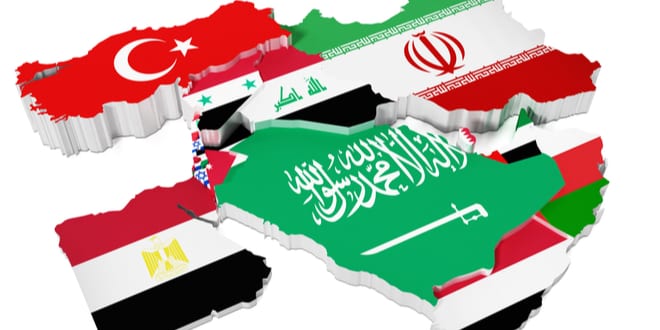In 2021, Iran’s ayatollahs and Turkey’s President Recep Tayyip Erdoğan—two religion-driven imperialistic regimes—pose the main existential threat to the (relatively) moderate Arab regimes. They incite domestic conflicts and violence and leverage the inherent intra-Arab fragmentation to preclude the formation of an effective united Arab front.
In 2021, the Shi’ite ayatollahs and Sunni Erdoğan—with the financial backing of Qatar—support the Sunni Muslim Brotherhood, militarily and financially. The Brotherhood is the largest Islamic terrorist organization in the world, and its goal is toppling all Arab regimes (e.g., Egypt, Jordan, Saudi Arabia, the United Arab Emirates and Bahrain)—using political and terrorist tools—as a step toward establishing a universal pan-Islamic society, which would overpower the West.
In 2021, far from abandoning their megalomaniacal vision and even considering peacefully coexisting and sharing power with its Sunni Arab neighbors, Teheran is actively exporting the Islamic revolution to every Arab country—via subversion and terrorism—as it has done in Iraq, Syria, Lebanon and Yemen.
The ayatollahs are taking advantage of their successful cooperation with the Shi’ite Houthis in the civil war in Yemen to destabilize Saudi Arabia, aiming to topple the Saudi regime and all other Arab Sunni regimes in the Arabian Peninsula.
While Iran and Turkey pursue two conflicting long-term visions—an imperialistic Shi’ite empire and the reestablishment of the Sunni Ottoman Empire—they are collaborating on the joint short-term goal of toppling every pro-U.S. Arab regime. Advancing this goal would further exacerbate the turbulence in the critical area between Europe, Asia and Africa and between the Mediterranean, the Red Sea, the Indian Ocean and the Persian Gulf, with grave military and economic global consequences, including the proliferation of anti-U.S. Islamic terrorism.
The United States has been systematically targeted by Islamic terrorism, an intrinsic feature of the Middle East since the seventh century, driven by fanatical anti-“infidel” and anti-Western ideology.
Islamic terrorism has focused on the United States since the Tripoli Barbary Muslim pirates in the 18th century, independent of U.S. policy in general and U.S. policy towards Israel in particular.
Islamic terrorism has zeroed in on the United States irrespective of the Arab-Israeli conflict, well-intentioned U.S. peace initiatives, frequent pressure on Israel by U.S. presidents, generous U.S. foreign aid to Arab (including Palestinian) regimes and occasional U.S. gestures toward the Palestinians, as demonstrated by the following recent examples:
• In March 1973, Palestinian terrorists murdered U.S. Ambassador to the Sudan Cleo Noel and Charge’ d’Affaires Curtis Moore, notwithstanding President Nixon’s and Secretary of State Rogers’ pressure for Israeli concessions to the Arabs.
• In June 1976, Palestinian terrorists murdered U.S. Ambassador to Lebanon Francis Meloy and Economic Counselor Robert Waring, despite President Ford’s and Secretary of State Kissinger’s pressure on Israel for concessions to the Arabs.
• In November 1979, Iran’s revolutionaries seized the U.S. Embassy in Tehran and took 63 Americans hostage for 444 days, in spite of President Carter’s support of Ayatollah Khomeini and betrayal of the Shah during the initial stage of the Islamic Revolution.
• In April and October 1983, the Iran-supported Islamic Jihad—in cooperation with Palestinian terrorists—bombed the U.S. Embassy and the U.S. Marine Corps headquarters in Beirut, murdering 36 and 242 Americans respectively. This despite the ongoing U.S.-PLO dialogue (from 1981 through December 1988, U.S. recognition of the PLO) and President Reagan’s brutal pressure on Israel to refrain from retaliating against PLO strongholds in Lebanon).
• In December 1988, Pan Am Flight 103 was blown up over Lockerbie, Scotland, by a Libyan-placed bomb, murdering 259 people, seven days after U.S. recognition of the PLO on Dec. 14.
• In February 1993, Al-Qaeda bombed the World Trade Center in New York City, murdering six people and causing $500 million in damage.
• In June 1996, Iran-supported Hezbollah bombed the U.S. military housing compound of Khobar Towers in Saudi Arabia, murdering 19 U.S. GIs, while President Clinton embraced Yasser Arafat.
• In August 1998, two Al-Qaeda bombs blasted the U.S. embassies in Kenya and Tanzania, murdering some 300 people (12 Americans), while President Clinton was brutally pressuring Israel for concessions to the Palestinians.
• In October 2000, Al-Qaeda terrorists bombed the USS Cole missile destroyer in the port of Aden, Yemen, murdering 17 sailors, while the United States and Israel offered unprecedented Israeli concessions to the Palestinians.
• On Sept. 11, 2001, Al-Qaeda terrorists crashed two airliners into the Twin Towers and an additional plane into the Pentagon, murdering 3,025 people, mostly Americans.
• In October 2003, Palestinian terrorists attacked a U.S. diplomatic convoy in Gaza, on its way to interview Palestinian candidates for Fulbright scholarships to study in the United States. Three security guards were murdered.
• In November 2009, Al-Qaeda-connected U.S. Army Major Nidal Hasan murdered 13 U.S. soldiers at Fort Hood, Texas.
• In May 2010, an Islamic terrorist, Faisal Shahzad, tried and failed to detonate a bomb in Times Square, New York.
• In September 2012, Islamic terrorists—who were assisted by the United States in their successful attempt to topple the Qaddafi regime in 2011—assaulted the U.S. consulate and the CIA compound in Benghazi, Libya, murdering four Americans.
• In December 2015, two Islamic terrorists murdered 14 Americans at the San Bernardino, California, Inland Regional Center.
• In June 2016, an Islamic terrorist murdered 49 people at a gay nightclub in Orlando, Fla.
• In October 2017, an Islamic terrorist drove a pickup truck into cyclists and runners in Lower Manhattan, murdering eight people.
• In December 2019, an Islamic terrorist murdered three U.S. Navy sailors at the Navy Air Station in Pensacola, Fla.
The bottom line
Underestimating the inherent anti-“infidel” and anti-Western nature of Islamic terrorism, and disregarding the central role played by the imperialistic and anti-Western vision of Iran’s ayatollahs and Turkey’s Erdoğan—as well as the pan-Islamic and anti-Western strategic goal of the Muslim Brotherhood—would severely undermine the existence of all pro-U.S. Arab regimes, while crippling the national security and economy of the United States.
The close cooperation between Israel and the United States on the operational, research and industrial levels has leveraged Israel’s daily experience in the battle against Islamic terrorism. It has provided the United States with a unique, cost-effective, battle-tested counter-terrorism laboratory, generating critical intelligence, battle tactics, cutting-edge technologies and advanced equipment—a unique force multiplier, sparing American lives and billions of dollars.
Reprinted with author’s permission from Jewish News Syndicate




